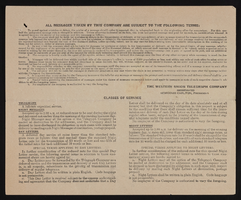Search the Special Collections and Archives Portal
Search Results
Castaways Hotel and Casino Photograph Collection
Identifier
Abstract
The Castaways Hotel and Casino Photograph Collection, approximately 1963 to 1987, consists of black-and-white and color photographic prints and negatives. Images depict the exterior of the entrance to the property, the mega-pylon sign, the pool area, and the “Gateway to Luck” replica temple in the courtyard area. The interior images depict various hotel rooms and suites, a couple dining, and a performance by Rusty Isabel, an entertainer in the Kon Tiki Lounge inside the property.
Archival Collection
Lawrence Revere Papers
Identifier
Abstract
The Lawrence Revere Papers primarily consist of correspondence between Lawrence Revere and the developers of blackjack betting systems dating from 1965 to 1970. The collection includes information about blackjack gambling systems, correspondence with gambling experts, and press material regarding the publication of Revere's book
Archival Collection
Index card envelopes cataloging films released between 1937 and 1977; includes titles, release details, credits, and newspaper and magazine clippings highlighting each film's premiere, approximately 1950 to 1977
Level of Description
Archival Collection
Collection Name: Howard Hughes Film Production Records
Box/Folder: Box 431 (Restrictions apply), Box 432 (Restrictions apply), Box 433 (Restrictions apply), Box 434 (Restrictions apply), Box 435 (Restrictions apply), Box 436 (Restrictions apply), Box 437 (Restrictions apply), Box 438 (Restrictions apply), Box 439 (Restrictions apply), Box 440 (Restrictions apply), Box 441 (Restrictions apply), Box 442 (Restrictions apply), Box 443 (Restrictions apply), Box 444 (Restrictions apply), Box 445 (Restrictions apply), Box 446 (Restrictions apply), Box 447 (Restrictions apply), Box 448 (Restrictions apply), Box 449 (Restrictions apply), Box 450 (Restrictions apply), Box 451 (Restrictions apply), Box 452 (Restrictions apply), Box 453 (Restrictions apply), Box 454 (Restrictions apply), Box 455 (Restrictions apply), Box 456 (Restrictions apply), Box 457 (Restrictions apply), Box 458 (Restrictions apply), Box 459 (Restrictions apply), Box 460 (Restrictions apply), Box 461 (Restrictions apply), Box 462 (Restrictions apply), Box 463 (Restrictions apply), Box 464 (Restrictions apply), Box 465 (Restrictions apply), Box 466 (Restrictions apply), Box 467 (Restrictions apply), Box 468 (Restrictions apply), Box 469 (Restrictions apply), Box 470 (Restrictions apply), Box 471 (Restrictions apply), Box 472 (Restrictions apply), Box 473 (Restrictions apply), Box 474 (Restrictions apply), Box 475 (Restrictions apply), Box 476 (Restrictions apply)
Archival Component
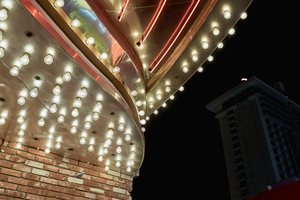
Photographs of Las Vegas Club signs, Las Vegas (Nev.), June 24, 2016
Date
Archival Collection
Description
Site name: Las Vegas Club (Las Vegas, Nev.)
Site address: 18 Fremont St
Sign owner: Las Vegas Club
Sign details: The Las Vegas Club originally opened on the opposite side of Fremont than it is today in the 1930's. It held one of the first few Neon signs on Fremont which was installed around ca.1930. In 1949 the Las Vegas Club reopened in its new location on Main and Fremont Street, and once held a large Baseball Hall of Fame. It has closed down in 2015 and demolition of the building began in 2017.
Sign condition: 4- Signage was working well and still had bright paint before the building had undergone demolition
Sign form: Pylon and architectural
Sign-specific description: They convey sports themes throughout their signs. There was a bronze-type sculptural baseball player. Large Neon and incandescent sign that wrapped around the whole building. Though above each entrance there is a plain graphic lettering with neon surrounding the letters.
Sign - type of display: Neon and Incandescent
Sign - media: Steel and bronze-type material (baseball player)
Sign - non-neon treatments: Sculptural element and incandescent
Sign animation: Flasher for incandescent
Sign environment: This location is on the north corner of Main and Fremont St. It is just north of the Golden Gate and across the street from the Plaza. It also had the Golden Goose, Glitter Gulch and Mermaids to the East of it.
Sign manufacturer: YESCO
Sign designer: Brian "Buzz" Lemming
Sign - date of installation: Circa 1960's
Sign - thematic influences: They convey sports/baseball themes within their signage which showcases the theme of their Baseball Hall of Fame.
Survey - research locations: Neon Museum Tour Hand book, Vintage Vegas http://vintagelasvegas.com/search/Las+Vegas+Club Images, Charles Barnard The Magic Sign.
Survey - research notes: The original Las Vegas Club in the 1930's had the tallest tallest sign in downtown Las Vegas until it was superseded by the Lucky Casino sign about a decade later.
Surveyor: Wyatt Currie-Diamond
Survey - date completed: 2017-09-02
Sign keywords: Architectural; Steel; Sculptural; Incandescent; Flashing; Neon; Bullnose
Mixed Content
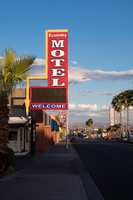
Photographs of Economy Motel sign, Las Vegas (Nev.), April 18, 2017
Date
Archival Collection
Description
Site address: 1605 Fremont St
Sign owner: Las Vegas Dragon Hotel LLC
Sign details: This building was constructed in 1953 for commercial living and motels and has been used for this since. This location was recently remodeled in 2016. The property previous to the Economy Motel was the Rangler Motel.
Sign condition: 5-looks newly restored
Sign form: Blade
Sign-specific description: The top of the sign is a red rectangular blade with the word "ECONOMY" in white skeletal neon tubes spelt out horizontally. Below the word Economy is the word "MOTEL" spelt out Vertically in channeled white letters with a blue border. Underneath this portion of the sign is a sign box where they have a plastic rectangular sign with their phone number on it. Under the sign box is "WELCOME" painted on the west side of the sign and "BIENVENDIO" on the east side. On the building side of the side box is a rectangular yellow arrow pointing down to the lobby of the motel.
Sign - type of display: Neon and plastic backlit sign
Sign - media: Steel and plastic
Sign - non-neon treatments: Plastic backlit sign
Sign environment: This location is on the East side of Fremont Street located close to many other motels some closed and some still open.
Sign - date of installation: Sign has been up but in a different form since at least 2007
Sign - date of redesign/move: Late 2016/ early 2017 repainted/ restored since it previously said Rangler Motel on the sign (had a plastic cover saying economy over that previous logo for a few years)
Sign - thematic influences: The arrow portion of this sign is a popular 1950's/60's motel sign theme.
Sign - artistic significance: It is a trend down on Fremont to take an old Motel sign and renovate it into the new motel's name and logo.
Survey - research locations: Owner's website http://www.1dragonhotel.com/about_us , assessor's map, Google map satellite view
Survey - research notes: The previous sign for the Rangler motel was repurposed for the Economy Motel, so the same MOTEL blade portion had the same font but channeled neon was added, as well as repainted.
Surveyor: Emily Fellmer
Survey - date completed: 2017-09-10
Sign keywords: Neon; Plastic; Steel; Pole sign; Electronic Message Center
Mixed Content
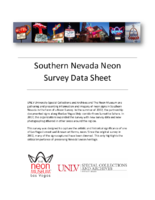
Fishers Inn Motel Neon Survey document, September 16, 2017
Date
Archival Collection
Description
Site address: 3565 Boulder Hwy
Sign owner: Maiya LLC
Sign details: The construction of the motel was in 1963. This location was previously the Comet Motel but the Fisher's bought it in 1987 and changed the name to Fisher's Inn Motel.
Sign condition: 5 - received new paint in 2017
Sign form: Raised roadside sign
Sign-specific description: This sign has a thin white steel beam base with plastic backlit sign that currently advertises ESPN, HBO, Over 150 channels and Free Wifi. Above the reader board is a rectangular (but has a curved portion to the top of it) blue sign that states "FI" on top in a cursive font, underneath in a block white font states "A Fisher's Inn". Underneath "A Fisher's Inn" there is are big yellow "MOTEL" block font letters with a simple "No Vacancy" skeletal neon beneath it. At night the "FI" illuminates yellow, "A Fisher's Inn" green, " MOTEL" red, "NO VACANCY" is blue, but on the top portion of the sign there is white skeletal neon in the shape of possibly a Fisherman's hat.
Sign - type of display: Neon and backlit plastic sign
Sign - media: Steel and plastic
Sign - non-neon treatments: Backlit plastic sign
Sign environment: This motel is on Boulder Highway, close to the 515 and is near other motels and car sales lots.
Sign - date of installation: c. 1987
Sign - date of redesign/move: 2017 painted blue when it used to be green
Sign - artistic significance: There's a good use of multiple colors on this sign. As well as repurposing older signs from previous property has been a major trend for signs in Vegas. Good example of skeletal neon.
Survey - research locations: Assessor's website
Survey - research notes: Bookings website gives hotel info https://www.booking.com/hotel/us/a-fishers- inn-motel.html
Surveyor: Emily Fellmer
Survey - date completed: 2017-09-16
Sign keywords: Neon; Backlit; Plastic; Steel; Roadside
Text
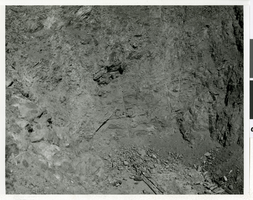
Photograph of the "Mole" Jarva Tunnel Borer at work on the Las Vegas River Mountain Project, Las Vegas, Nevada, circa 1968-1971
Date
Archival Collection
Description
Image
Audio recording clip of interview with Faye Todd by Claytee D. White, October 15, 1996
Date
Archival Collection
Description
Part of an interview with Faye Todd by Claytee White on October 15, 1996. Todd discusses how she came to work for the Landmark and what it was like to work with entertainers.
Sound

Transcript of interview with Bess Rosenberg by Jerry Masini, November 12, 1975
Date
Archival Collection
Description
Interview with Bess Rosenberg by Jerry Masini on November 12, 1975. In this interview, Rosenberg describes coming to Las Vegas in 1942, and the desert landscape. She gives an in-depth recollection of the first atomic test, and talks about different weather and the seasons in Las Vegas. Rosenberg describes several clubs and hotels around downtown and the recreation at Lake Mead and Mount Charleston.
Text

